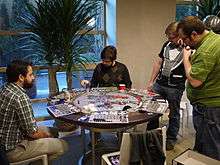Eclipse (board game)
Eclipse: New Dawn for the Galaxy (commonly known as Eclipse) is a strategy board game produced by Lautapelit.fi. It was designed by Touko Tahkokallio and first released in 2011. The game currently has three expansions – Rise of the Ancients, released in 2012, Ship Pack One, released in 2013 and Shadow of the Rift, released in 2015 – and four mini expansions.
| New Dawn for the Galaxy | |
|---|---|
 | |
| Designer(s) | Touko Tahkokallio |
| Illustrator(s) | Ossi Hiekkala Sampo Sikiö |
| Publisher(s) | Lautapelit.fi |
| Publication date | 2011 |
| Genre(s) | Strategy |
| Language(s) | English |
| Players | 2–6 (up to 9 with the Rise of the Ancients expansion.) |
| Playing time | 2–3 hours |
| Age range | 14+ |
| Website | Lautapelit.fi: Eclipse |
Game background
After a ruthless war, the galaxy has been at peace because of the efforts of the major spacefaring species to preserve it. The Galactic Council was formed for that purpose. But tension is mounting again, and a new conflict seems to be inevitable. Which faction will prevail and lead the galaxy?
Gameplay

Eclipse is a 4X strategy game where you must lead your civilization to prevail over the others.[1] Players can choose to play as either a human or alien civilization. On each move, a player takes one of six actions: building, exploring, influencing, moving, researching or upgrading. For example, exploring opens up a new tile in a direction chosen by the exploring player. Each action uses resources (money, materials or science), and resource management is a key part of gameplay.[2]
The galaxy is laid out in three rings of hex tiles, most of which get laid during exploration. At the start of play, only the galaxy center tile and tiles for the players' respective home stars are laid. When exploring, a player chooses a tileless space which is accessible from a star the player occupies. The player then draws a new hex tile from a stack of face-down tiles and lays it in the chosen direction. The player may strategically choose which orientation the tile takes, to create links to existing tiles or to block access by other players.
Game contents
- 84 plastic spaceships
- 24 starbase chits
- 264 wooden population cubes
- 96 wooden influence discs
- 18 ambassador tiles
- 44 sector hexes
- 6 player boards
- 1 supply board
- 96 technology tiles
- 154 ship part tiles
- 21 discovery tiles
- 22 colony ship tiles
- 21 ancient ship tiles
- 1 GCDG tile
- 32 reputation tiles
- 22 orbital/monolith tiles
- 2 crowded hex tiles
- 6 summary cards
- 1 traitor card
- 4 info cards
- 18 plastic dice
- 18 wooden storage markers
- 12 wooden damage cubes
- 1 start player marker
- 1 round marker
- rulebook
Honors and awards
Eclipse has received the following honors and awards:[1]
- Charles S. Roberts Best Science-Fiction or Fantasy Board Wargame Nominee (2011)
- Jogo do Ano Nominee (2011)
- Golden Geek Best Board Game Artwork/Presentation Nominee (2012)
- Golden Geek Best Innovative Board Game Nominee (2012)
- Golden Geek Best Strategy Board Game Nominee (2012)
- Golden Geek Best Thematic Board Game Nominee (2012)
- Golden Geek Best Wargame Nominee (2012)
- Golden Geek Board Game of the Year Winner (2012)
- Golden Geek Golden Geek Best Strategy Board Game Winner (2012)
- International Gamers Award – General Strategy: Multi-player Nominee
- JoTa Best Gamer Game Audience Award (2012)
- JoTa Best Gamer Game Nominee (2012)
- JUG Game of the Year Winner (2012)
- Ludoteca Ideale Winner (2012)
- Lys Passioné Finalist (2012)
- Lys Passioné Winner (2012)
- Tric Trac Nominee (2012)
Electronic versions
The iOS version of the game was released in 2013.
Android and Steam versions were released in 2016.
References
- "Eclipse (2011)". BoardGameGeek, LLC. Retrieved 1 January 2014.
- "Eclipse Board Game : The no-nonsense overview I wished I had found elsewhere. Part 1". Boardgamery. Archived from the original on 16 January 2014. Retrieved 15 January 2014.
- "Eclipse" review by BoardGameKing.com